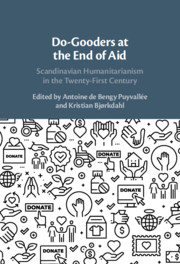Do-Gooders at the End of Aid
Scandinavian countries are routinely considered exceptional for their commitment to development cooperation, peace mediation, and humanitarian action. This book highlights how the political culture of Scandinavia is indeed characterized by the idea of doing good on the world stage, but then shows how this “Scandinavian Humanitarian Brand” is an asset that policymakers and others can capitalize on to legitimize policy interventions and ideas, or to advance commercial, diplomatic, and security interests. Providing case studies from all Scandinavian countries, this book shows how the brand is made, reinforced, and used in a variety of policy contexts, from foreign aid and humanitarian assistance; to military operations, peace-building, and mediation; to migration policy, global health and international cooperation. A key objective of the book is to explain why the Scandinavian Humanitarian Brand retains such apparent resilience in a time when Scandinavia’s characteristic approach to world affairs seems challenged from many sides at once. This title is also available as Open Access on Cambridge Core.
Antoine de Bengy Puyvallée is a PhD fellow at the University of Oslo’s Centre for Development and the Environment. His research focuses on the politics of epidemic preparedness and response, and particularly public–private cooperation for emergency response capacities, vaccines and digital technologies.
Kristian Bjørkdahl is a postdoctoral fellow at the University of Oslo’s Centre for Development and the Environment. His current work focuses on the idea of Nordic colonial innocence, and he also does research on science communication, pandemic communication, rhetorical history and theory.

